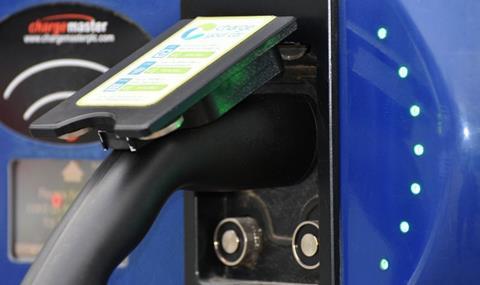
Government plans to double the number of electric vehicle charge points to nearly 8,000 this year by offering £20m of funding to local authorities do not go far enough, a leading think tank warned this week.
The warning follows government confirmation this week that funding for the On-Street Residential Chargepoint Scheme (ORCS) will continue into 2021/22, allowing residents without private parking to reliably charge their vehicle.
Local authorities are being urged to take advantage of a £20m cash injection to boost the number of on-street electric vehicle charge points in towns and cities across the UK.
Announcing the funding, transport secretary Grant Shapps said: “From Cumbria to Cornwall, drivers across the country should benefit from the electric vehicle revolution we’re seeing right now.
“With a world-leading charging network, we’re making it easier for more people to switch to electric vehicles, creating healthier neighbourhoods and cleaning up our air as we build back greener.”
However a report published by think tank Policy Exchange this week warns that the rollout of electric vehicle charge points must become five times quicker to support the upcoming ban on new petrol and diesel cars and vans.
Its research shows that the UK will need 400,000 public charge points when the sale of new conventionally-fuelled cars and vans is banned in 2030, up from 35,000 currently.
To reach this total, the annual rate of installations must increase from around 7,000 over the past three years to 35,000 over the next decade.
Policy Exchange is calling for the government to issue contracts to private firms to install charge points in areas where they are sparse. This would mark a switch from the existing policy of offering grants, and would be similar to offshore wind farm auctions.
Report author and Policy Exchange senior research fellow Ed Birkett said the government should focus on areas where it "isn't delivering enough public charge points, including the north west of England, Yorkshire and Northern Ireland".
Independent transport research group New Automotive also called for a step change in the speed of the roll out and for local authorities to take action.
Chairman Gi Fernando, said: “We welcome this announcement of £20m from the government for 4,000 more on-street charge points across the UK. However, it’s very clear that there needs to be a step change in the speed with which chargers are being installed.
“The vast majority of local authorities haven’t applied for the grants available to them to improve the charging network in their areas. Out of the 11,930 local authorities in the UK, only 101 have received grant funding for residential chargepoints, which are vital to giving people the confidence to switch to an EV.
“We need local authorities to recognise that they have a vital role to play in the electric vehicle revolution.”














